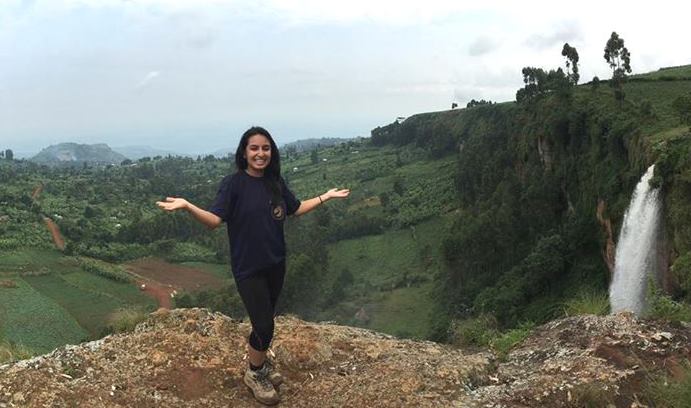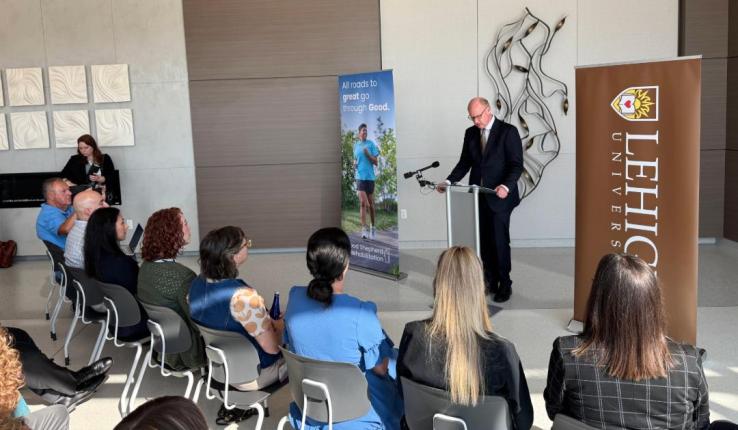Remembering Malaria’s History

Priyokti Rana spent last summer in Uganda through the Iacocca International Internship program. She will spend this summer in Nepal studying NGOs involved in health-related activities. (Photo courtesy of Priyokti Rana)
Many Americans might remember from their school days that malaria and yellow fever slowed the construction of the Panama Canal or that the two diseases killed more soldiers than died in battle during the Spanish-American War.
But few, Priyokti Rana ’18 suspects, would have learned that malaria played a role in Scotland’s decision to sign the Act of Union with England and form Great Britain in 1707.
Rana, who was born in Nepal and grew up in Massachusetts, majors in IDEAS (Integrated Degree in Engineering, Arts and Sciences), a four-year B.S. honors program. Her concentrations are in bioengineering and health, medicine and society (HMS).
She first became interested in malaria last summer, when she and five other Lehigh students spent eight weeks in the town of Bududa in eastern Uganda, near the border with Kenya.
Rana and two other students were funded by the Iacocca International Internship Program. The remaining students received Dale S. Strohl ’58 Awards for Research Excellence in Social Sciences and Humanities.
The students stayed with a host family and worked with a local nongovernmental organization (NGO), Pathways Development Initiative, on two projects: pre-school education and a village savings and loan initiative.
“In the mornings, we would help teachers come up with innovative and different ways of engaging their students,” says Rana. “In the afternoons we worked with savings groups in Bududa to think of things they could do to generate income.”
In their spare time, the students formed a book club. One of the books they read and discussed was The Fever: How Malaria Has Ruled Humankind for 500,000 Years by Sonia Shah.
Reading The Fever, Rana says, opened her eyes.
“I was really intrigued by that book. I had never learned about malaria in high school. In our HMS classes at Lehigh, though, we did learn that diseases have killed a lot more soldiers during wars than battles.
“The whole trip was a very valuable experience. It gave me a new perspective on health through this disease—malaria.”
Malaria is an infectious disease that is caused by parasites and transmitted by mosquitoes. It is relatively rare in the United States, with fewer than 20,000 cases reported annually. Globally, however, malaria afflicts more than 200 million people and causes more than 400,000 deaths a year, according to the World Health Organization. It is especially prevalent in sub-Saharan Africa, including Uganda.
“A lot of the members of our host family had had malaria,” says Rana. “People die of malaria in Uganda, mostly children who have not yet built up a resistance. Pregnant women are also at a much higher risk of dying or having a miscarriage if they get malaria.”
Ugandans use bed nets and insecticide to prevent mosquito bites, Rana says. Those who are infected seek treatment at clinics, which can be a challenge in Uganda, as roads are generally poor, clinics are few and far between, and medicine is often in short supply.
Rana returned to Lehigh for the fall semester and completed an independent study project in malaria. In December, she gave a presentation to the HMS Brown Bag Lunch Series titled “Malaria, Forgotten from the History Books: The Unrecognized, Yet Amazing Influence of Malaria on World History.”
Wars have been won and lost because of malaria, she said, and genetic mutations have occurred. The Roll Back Malaria Partnership and other global initiatives have been formed to fight the disease.
And in the late 1600s and early 1700s, when Scotland tried to establish a colony called Caledonia in the Darien region of what is now Panama, it failed in part because many settlers died of malaria or yellow fever. The collapse of the project indebted the nation and many of its nobles and contributed to the decision by the Scottish Parliament to pass the Union with England Act in 1707.
The trip to Uganda was Rana’s third to another country as a Lehigh student. In the summer of 2015, she traveled to Cebadilla, a village in Nicaragua, with Lehigh’s chapter of Engineers Without Borders. The purpose of the trip was to prepare for the installation of a water-distribution system.
“We met with community partners to find out about the community’s needs,” says Rana, who is fundraising chair for the Lehigh chapter. “It’s been a learning experience for me. I’ve learned through my peers how to begin a project and see it through to completion. Other students in the chapter have shown me the importance of the social aspects of engineering, especially in the developing world. You can’t just build a water system; you have to talk to the community first and make sure they want it and need it.”
During the winter of her sophomore year, Rana returned to Central America, this time to Costa Rica to take a course in sustainable development.
Rana plans to spend this summer in Nepal, where a Lehigh Grant for Experiential Learning in Health (GELH) will enable her to shadow a doctor and conduct a study of NGOs involved in health-related activities.
“I have a lot of contacts in Nepal,” she says. “My grandparents still live there, and I know some NGO founders.”
Rana says the IDEAS program has enabled her to take advantage of overseas opportunities while shaping her education.
“After high school, I had no idea what I wanted to do, but I knew I didn’t want to limit myself in any way. The IDEAS program has given me the freedom to find what I’m interested in.
“I like what I’m doing and the direction I’m going, and a lot of that is because of the IDEAS program.”
Rana gives credit to her academic adviser, William Best, co-director of the IDEAS program and professor of practice in the department of electrical and computer engineering, and to her bioengineering advisers: Xuanhong Cheng, associate professor of materials science and engineering, and Susan Perry and Lori Herz, professors of practice in the department of chemical and biomolecular engineering.
She especially appreciates her HMS adviser, Kelly Austin, who directs the HMS program and is assistant professor of sociology in the department of sociology and anthropology.
“Kelly Austin has had a huge influence on my life, in college and afterwards,” says Rana. “She really believes in her students and empowers them to strive to do more. She also urges us to consider the great inequalities of the world.
“Coming to Lehigh has been the best decision of my life in terms of traveling to different countries and learning something substantive about each of them.
“I’m really grateful for the opportunities Lehigh has given me. It has been a privilege for me to be a part of all this.”
Story by Kurt Pfitzer
Posted on:




